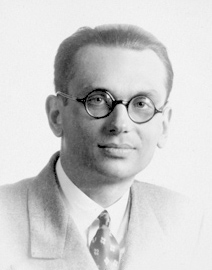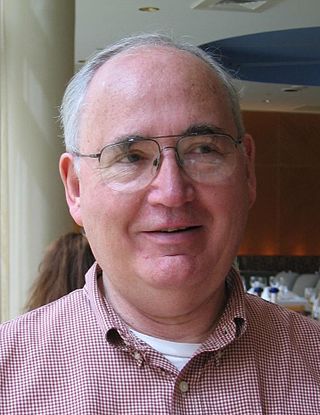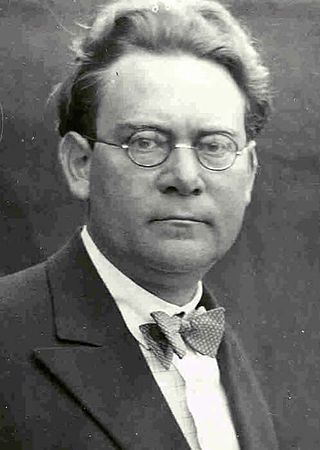Related Research Articles

Georg Henrik von Wright was a Finnish philosopher.

Kurt Friedrich Gödel was a logician, mathematician, and philosopher. Considered along with Aristotle and Gottlob Frege to be one of the most significant logicians in history, Gödel profoundly influenced scientific and philosophical thinking in the 20th century, building on earlier work by Frege, Richard Dedekind, and Georg Cantor.

Friedrich Ludwig Gottlob Frege was a German philosopher, logician, and mathematician. He was a mathematics professor at the University of Jena, and is understood by many to be the father of analytic philosophy, concentrating on the philosophy of language, logic, and mathematics. Though he was largely ignored during his lifetime, Giuseppe Peano (1858–1932), Bertrand Russell (1872–1970), and, to some extent, Ludwig Wittgenstein (1889–1951) introduced his work to later generations of philosophers. Frege is widely considered to be the greatest logician since Aristotle, and one of the most profound philosophers of mathematics ever.

Rudolf Carnap was a German-language philosopher who was active in Europe before 1935 and in the United States thereafter. He was a major member of the Vienna Circle and an advocate of logical positivism.

Alfred Tarski was a Polish-American logician and mathematician. A prolific author best known for his work on model theory, metamathematics, and algebraic logic, he also contributed to abstract algebra, topology, geometry, measure theory, mathematical logic, set theory, and analytic philosophy.

Dana Stewart Scott is an American logician who is the emeritus Hillman University Professor of Computer Science, Philosophy, and Mathematical Logic at Carnegie Mellon University; he is now retired and lives in Berkeley, California. His work on automata theory earned him the Turing Award in 1976, while his collaborative work with Christopher Strachey in the 1970s laid the foundations of modern approaches to the semantics of programming languages. He has also worked on modal logic, topology, and category theory.

The Royal Swedish Academy of Sciences is one of the royal academies of Sweden. Founded on 2 June 1739, it is an independent, non-governmental scientific organization that takes special responsibility for promoting natural sciences and mathematics and strengthening their influence in society, whilst endeavouring to promote the exchange of ideas between various disciplines.
The Rolf Schock Prizes were established and endowed by bequest of philosopher and artist Rolf Schock (1933–1986). The prizes were first awarded in Stockholm, Sweden, in 1993 and, since 2005, are awarded every three years. It is sometimes considered the equivalent of the Nobel Prize in Philosophy. Each recipient receives SEK 600,000.

Sir Peter Frederick Strawson was an English philosopher who spent most of his career at the University of Oxford. He was the Waynflete Professor of Metaphysical Philosophy at Magdalen College, Oxford from 1968 to 1987. He had previously held the positions of college lecturer and tutorial fellow at University College, Oxford, a college he returned to upon his retirement in 1987, and which provided him with rooms until his death.

Jan Łukasiewicz was a Polish logician and philosopher who is best known for Polish notation and Łukasiewicz logic. His work centred on philosophical logic, mathematical logic and history of logic. He thought innovatively about traditional propositional logic, the principle of non-contradiction and the law of excluded middle, offering one of the earliest systems of many-valued logic. Contemporary research on Aristotelian logic also builds on innovative works by Łukasiewicz, which applied methods from modern logic to the formalization of Aristotle's syllogistic.
The year 1896 in science and technology involved some significant events, listed below.

Hans Reichenbach was a leading philosopher of science, educator, and proponent of logical empiricism. He was influential in the areas of science, education, and of logical empiricism. He founded the Gesellschaft für empirische Philosophie in Berlin in 1928, also known as the "Berlin Circle". Carl Gustav Hempel, Richard von Mises, David Hilbert and Kurt Grelling all became members of the Berlin Circle.
Sven Ove Hansson is a Swedish philosopher. He is a professor of philosophy and chair of the Department of Philosophy and History of Technology at the Royal Institute of Technology (KTH) in Stockholm, Sweden. He is an author and scientific skeptic, with a special interest in environmental risk assessment, as well as in decision theory and belief revision.
Robert Buford Pippin is an American philosopher. He is the Evelyn Stefansson Nef Distinguished Service Professor in the John U. Nef Committee on Social Thought, the Department of Philosophy, and the college at the University of Chicago.

Franklin Rudolf Ankersmit is professor of intellectual history and historical theory at the University of Groningen.

Johan Anthony Willem "Hans" Kamp is a Dutch philosopher and linguist, responsible for introducing discourse representation theory (DRT) in 1981.
Jindřich Zelený was a Czech philosopher and the author of several books.

Studia Logica, is a scientific journal publishing papers employing formal tools from Mathematics and Logic. The scope of papers published in Studia Logica covers all scientific disciplines; the key criterion for published papers is not their topic but their method: they are required to contain significant and original results concerning formal systems and their properties. The journal offers papers on topics in general logic and on applications of logic to methodology of science, linguistics, philosophy, and other branches of knowledge. The journal is published by the Institute of Philosophy and Sociology of the Polish Academy of Sciences and Springer publications.
2011 in philosophy
1993 in philosophy
References
- ↑ "Dana S Scott". The Royal Swedish Academy of Sciences. Retrieved 19 January 2013.